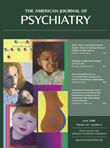Family Psychiatry: From Research to Practice
Abstract
Objective: The purpose of this article is to review current research evidence for clinicians involving families in the assessment and treatment of their patients. Method: Research on effects of family support on illness outcome and outcomes of family-centered treatment in medicine, pediatrics, and psychiatry are reviewed. Results: Research in many medical fields shows that families have powerful influences on health that are equal to or surpass other risk factors and that brief family interventions increase health and decrease the risk of relapse in chronic illnesses. Research in psychiatry affirms that family interventions reduce the rate of relapse, improve recovery, and increase family well-being. Conclusions: Current evidence supports increased emphasis on family-oriented psychiatric practice.



